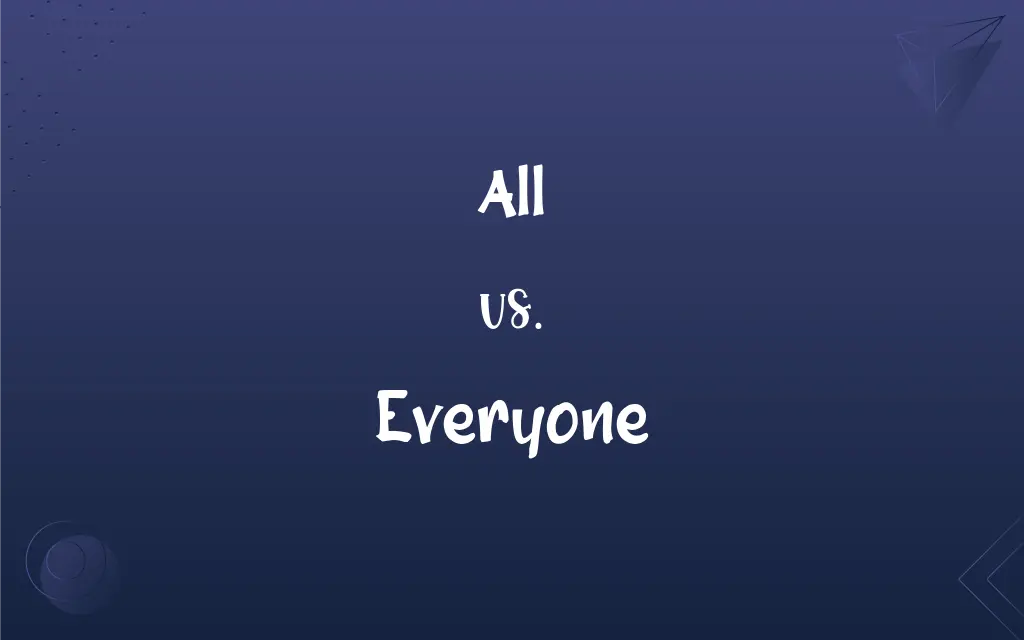All vs. Everyone: What's the Difference?
Edited by Aimie Carlson || By Harlon Moss || Updated on November 7, 2023
"All" refers to the entire number or amount of a group or thing, while "everyone" specifically refers to every person in a group.

Key Differences
"All" and "everyone" are both pronouns used to refer to every member of a group, but they differ in usage and context. "All" is a versatile term that can refer to the total number of people, items, or concepts in a group or collection, implying a focus on the group as a whole unit. Conversely, "everyone" specifically refers to every individual within a group of people, emphasizing the separate individuals within the group. For instance, "all" could be used in a variety of contexts such as "all the books on the shelf," whereas "everyone" would be used exclusively for people, as in "everyone at the meeting."
While "all" has a broader application, "everyone" is more personal and singular in its approach. "All" can be used to describe groups of objects or concepts as well as people, such as "all the stars in the sky," showcasing its range. "Everyone," however, is solely used to refer to people, often in a way that highlights the individuality of the members, such as in the phrase "everyone has a story to tell." This distinction underlines the impersonal versus personal nature of "all" and "everyone," respectively.
The inclusivity of "all" and "everyone" can also differ in implication. "All" might suggest a focus on the entirety of a group without necessarily considering the individuals, as in "all the ingredients were added to the cake." On the other hand, "everyone" guarantees that not a single person is excluded, as in "everyone is welcome to join the club," which ensures that each person is acknowledged.
In usage, "all" can be paired with both countable and uncountable nouns, making it more flexible. For example, "all water is essential for life" and "all students must submit their papers." In contrast, "everyone" can only be used with countable nouns in the plural form that represent people, such as "everyone in the choir sings beautifully." It cannot be used with uncountable nouns or with objects, which is a significant grammatical distinction between the two.
"All" can suggest a quantitative aspect, often associated with the idea of the sum of parts, as in "all of the paintings were sold." "Everyone," however, suggests a qualitative aspect, referring to each individual's presence or participation, as in "everyone enjoyed the concert." This subtle nuance highlights how "all" can be about the collective quantity, whereas "everyone" is about the inclusive quality of acknowledging every individual within a group.
ADVERTISEMENT
Comparison Chart
Reference
Things or people collectively
Only people collectively
Grammar
Can be a pronoun or a determiner
Always used as a pronoun
Usage with Nouns
Can modify both countable and uncountable nouns
Does not modify nouns
Scope
Broad, can refer to total amount, extent, or duration
Specific to each individual in a group
Examples
All the cookies were eaten.
Everyone in the room was laughing.
ADVERTISEMENT
All and Everyone Definitions
All
Everything.
All is fair in love and war.
Everyone
Each person.
Everyone has a story to tell.
All
Completely; entirely.
The movie was all but over when we arrived.
Everyone
All persons present.
Everyone, please take your seats.
All
The whole number of.
All the books are due tomorrow.
Everyone
The whole number of people.
Everyone cheered for the winner.
All
The only thing; nothing but.
The view was all sand and sky.
Everyone
All people.
Everyone needs to eat and sleep.
All
The whole extent or duration of.
She was happy all day.
Everyone
Every person.
All
Being or representing the entire or total number, amount, or quantity
All the windows are open. Deal all the cards.
Everyone
Everybody; - commonly separated, every one.
All
Constituting, being, or representing the total extent or the whole
All Christendom.
FAQs
What does "all" encompass?
"All" includes the entire amount, number, or extent of something.
Is "everyone" used for a group of objects?
No, "everyone" is only used to refer to people.
Does "everyone" include animals?
No, "everyone" specifically refers to all people, not animals.
Can "all" refer to time?
Yes, "all" can refer to the entire duration of time.
Can "everyone" be used to address a specific group?
Yes, "everyone" can address all individuals within a specific group.
Does "everyone" have a plural form?
No, "everyone" is treated as a singular pronoun.
How is "all" used differently from "everyone"?
"All" can refer to things and people, while "everyone" refers only to people.
How does "all" function in a sentence?
"All" can function as a subject, object, or an adjective.
Can "all" and "everyone" be used interchangeably?
Not always, as "all" can refer to more than just people.
Does "all" have a plural form?
"All" is both singular and plural depending on its noun.
Can "all" refer to abstract concepts?
Yes, "all" can refer to abstract concepts like "all love," "all knowledge."
How does "everyone" function in a sentence?
"Everyone" functions as a subject or object pronoun.
What is the possessive form of "everyone"?
The possessive form is "everyone's."
Can "everyone" be used in questions?
Yes, as in "Does everyone understand?"
Does "everyone" always mean 100% of people?
"Everyone" typically means all people considered in the context.
Can "all" modify a noun?
Yes, "all" can directly modify nouns, as in "all members."
Can "all" be possessive?
Yes, as in "all's well that ends well."
Can "all" refer to an entire group without exception?
Yes, "all" can refer to an entire group without exception.
Can "all" be used in questions?
Yes, as in "Do all of you agree?"
Is "everyone" formal or informal?
"Everyone" can be used in both formal and informal contexts.
About Author
Written by
Harlon MossHarlon is a seasoned quality moderator and accomplished content writer for Difference Wiki. An alumnus of the prestigious University of California, he earned his degree in Computer Science. Leveraging his academic background, Harlon brings a meticulous and informed perspective to his work, ensuring content accuracy and excellence.
Edited by
Aimie CarlsonAimie Carlson, holding a master's degree in English literature, is a fervent English language enthusiast. She lends her writing talents to Difference Wiki, a prominent website that specializes in comparisons, offering readers insightful analyses that both captivate and inform.































































